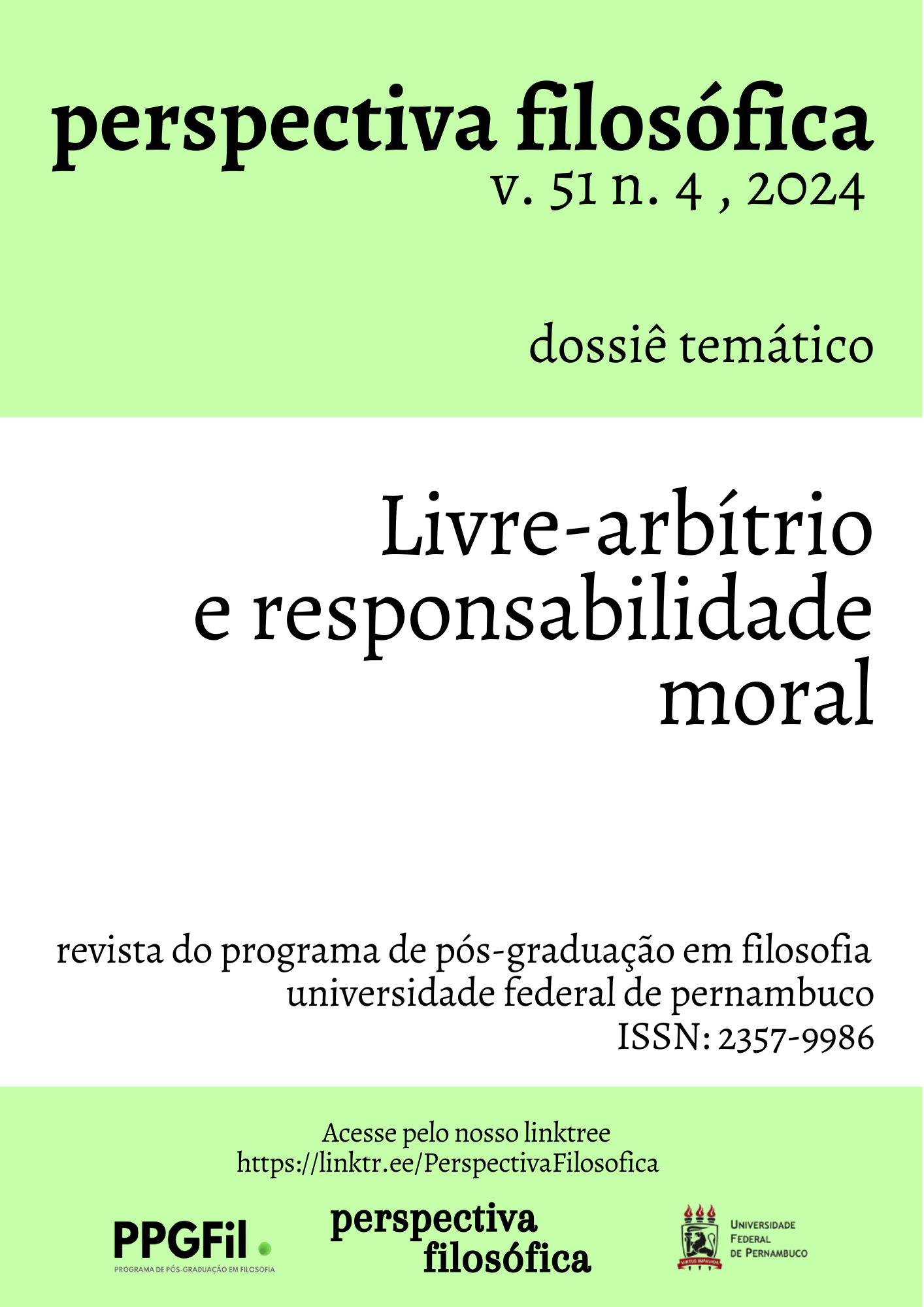Reclaiming responsibility
an ameliorative proposal
DOI:
https://doi.org/10.51359/2357-9986.2024.265132Keywords:
retribution, rehabilitation, amelioration, ideal theory, moral responsibilityAbstract
This paper considers and critiques two models of moral responsibility: the retributive model, which sees holding-responsible as a retributive or punitive response to a wrongdoer, and the rehabilitative model, which sees holding-responsible as a tool for agency enhancement, moral improvement, or moral scaffolding. I argue that, while responsibility can serve these purposes, it should do so in a way that (also) addresses oppression. I call this view “ameliorative” because it seeks to ameliorate the responsibility system through social justice. In making this argument, I underscore the connections between retribution and rehabilitation in practice (i.e., in the real world) and structural injustice. These connections are too often elided or overlooked in optimistic accounts of responsibility’s retributive and rehabilitative potential, in contrast to their bleak reality.
References
BELL, Macalester. Hard feelings: The moral psychology of contempt. New York: Oxford University Press, 2013.
BELL, Macalester. “The standing to blame: A critique”. In: COATES, D. Justin & TOGNAZZINI, Neal (ed.). Blame: Its nature and norms. Oxford: Oxford University Press, 2012. p. 263-281.
CARUSO, Gregg. D.; PEREBOOM, Derk. Moral Responsibility Reconsidered. Cambridge: Cambridge University Press 2002.
CLARE, Eli. Brilliant imperfection: Grappling with cure. Durham: Duke University Press, 2017.
COATES, D. Justin & TOGNAZZINI, Neal. “Blame”. In: ZALTA, Edward N.; NODELMAN, Uri. The Stanford Encyclopedia of Philosophy, 2024. https://plato.stanford.edu/archives/fall2023/entries/blame/.
COLLINS, Patricia Hill. Black feminist thought: Knowledge, consciousness, and the politics of empowerment. New York: Routledge, 2022.
DAVIS, Angela. Y. Are prisons obsolete? Seven Stories Press, 2011.
DORIS, John M. Talking to our selves: Reflection, ignorance, and agency. Oxford: Oxford University Press, 2015.
FORMAN, Milos (Director). One Flew Over the Cuckoo's Nest [Film]. Warner Bros, 1975.
FRENCH, Peter. A. The virtues of vengeance. Lawrence: University Press of Kansas, 2001.
FRIEDAN, Betty. The feminine mystique. New York: W.W. Norton & Company, 1963.
FRYE, Marilyn. Politics of reality: Essays in feminist theory. Trumansburg: Crossing Press, 1983.
HASLANGER, Sally. “Gender and race: (What) are they? (What) do we want them to be?” Noûs, v. 34 , n. 1, 2000, p. 31–55.
HIERONYMI, Pamela. “The force and fairness of blame”. Philosophical perspectives, v. 18, 2004, p. 115-148.
HOLROYD, Jules. “Oppressive praise”. Feminist Philosophy Quarterly, v. 7, n. 4, 2021 https://doi.org/10.5206/fpq/2021.4.13967.
HOLROYD, Jules. (2024). “The distortions of oppressive praise: Challenges for practice-dependent theories of moral responsibility”. Feminist Philosophy Quarterly, v. 10, 2024, https://ojs.lib.uwo.ca/index.php/fpq/article/view/18718.
HOOKS, Bell. All about love: New visions. New York: Harper Collins, 2000.
HOOKS, Bell. Cultural criticism and transformation. Interview transcript. Media
Education Foundation, n.d., 1997, https://www.mediaed.org/transcripts/Bell-Hooks-Transcript.pdf.
LEVY, Neil. Hard luck: How luck undermines free will and moral responsibility. Oxford: Oxford University Press, 2011.
LEWIS, Sophie. Abolish the family: A manifesto for care and liberation. London: Verso Books, 2022.
LORDE, Audre. Sister outsider: Essay and speeches. Trumansburg, NY: Crossing Press, 1984 https://rhinehartibenglish.weebly.com/uploads/2/2/1/0/22108252/sister_outsider_audrey_lorde_ib_pdf_packet.pdf
LUGONES, María. “Playfulness,“world”-travelling, and loving perception”. Hypatia, v. 2, n. 2, 1987, p. 3-19.
MANNE, Kate. Down girl: The logic of misogyny. New York: Oxford University Press, 2017.
MATTLIN, Ben. Disability pride: Dispatches from a post-ADA world. Boston: Beacon Press, 2022.
MARX, Karl. Das kapital: kritik der politischen okonomie. Hamburg: Verlag von Otto Meissner, 1867.
MCGEER, Victoria. “Building a better theory of responsibility”. Philosophical Studies, v. 172, 2015, p. 2635-2649.
MEISSNER, Shelbi Nahwilet; SMITH, Andrew. Frederick. “Climate crisis as relational crisis: Centering Indigenous feminist conceptions of responsibility in environmental discourse”. Feminist Philosophy Quarterly, v. 10, 2024, https://ojs.lib.uwo.ca/index.php/fpq/article/view/18724.
METZL, Jonathan M. The protest psychosis: How schizophrenia became a black disease. Boston: Beacon Press, 2010.
MCKENNA, Michael. Conversation & responsibility. New York: Oxford University Press, 2012.
MOORE, Michael. S. Placing blame: A theory of the criminal law. Oxford University Press, 2010.
MURTHY, T. Virgil. “Against Arguing about Addict Agency”. Feminist Philosophy
Quarterly, v. 10, 2024, https://ojs.lib.uwo.ca/index.php/fpq/article/view/18722.
NEWNHAN, Nicole, & LeBrecht, James (Directors). Crip Camp: A Disability Revolution [Film]. Netflix, 2020.
PATEMAN, Carole. The sexual contract. Stanford University Press, 1988.
PITTS, Andrea. J. “Disability bioethics and race”. In: REYNOLDS, Joel Michael; WIESELER, Christine (eds). The Disability Bioethics Reader. New York, London: Routledge, 2022. p. 35-242.
SMITH, Angela. “Moral blame and moral protest”. In: COATES, D. Justin & TOGNAZZINI, Neal (ed.). Blame: Its nature and norms. Oxford: Oxford University Press, 2013. doi:10.1093/acprof:oso/9780199860821.003.0002
SOLOMON, Robert C. “In defense of sentimentality”. Philosophy and Literature, v. 14, n. 2, 1990, p. 304-323.
STRAWSON, Peter. F. Freedom and resentment and other essays. London: Routledge, 2008.
TÁÍWÒ, Olúfemi. O. Elite capture: How the powerful took over identity politics (and everything else). Chicago: Haymarket Books, 2022.
TREMAIN, Shelley Lynn. “When moral responsibility theory met my philosophy of disability”. Feminist Philosophy Quarterly, v. 10, 2024, https://ojs.lib.uwo.ca/index.php/fpq/article/view/18720.
TREMAIN, Shelley. Lynn. “Philosophy of disability, conceptual engineering, and the nursing home-industrial-complex in Canada”. International Journal of Critical Diversity Studies, v. 4, n. 1, 2021, p. 10-33.
VARGAS, Manuel. Building better beings: A theory of moral responsibility. Oxford University Press, 2013.
WALKER, Margaret Urban. Moral repair: Reconstructing moral relations after wrongdoing. Cambridge University Press, 2006.
WALLER, Bruce N. The stubborn system of moral responsibility. Cambridge, Mass: MIT Press, 2015.
WOLF, Susan. “Blame, Italian style”. In: WALLACE, R. Jay; KUMAR, Rahul; Freeman, Samuel Richard (ed.). Reasons and Cognition: Essays on the Philosophy of T.M. Scanlon. Oxford University Press, 2011, p. 332-347.
Downloads
Published
Issue
Section
License
Copyright (c) 2024 Michelle Ciurria

This work is licensed under a Creative Commons Attribution 4.0 International License.
A Revista Perspectiva Filosófica orienta seus procedimentos de gestão de artigos conforme as diretrizes básicas formuladas pelo Conselho Nacional de Desenvolvimento Científico e Tecnológico (CNPq). http://www.cnpq.br/web/guest/diretrizesAutores que publicam nesta revista concordam com os seguintes termos:
Os autores mantém os direitos autorais e concedem à revista o direito de primeira publicação, sendo o trabalho simultaneamente licenciado sob https://creativecommons.org/licenses/by/4.0/deed.pt_BR que permite o compartilhamento do trabalho com reconhecimento da autoria e publicação inicial nesta revista.
Os autores têm autorização para assumir contratos adicionais separadamente, para distribuição não-exclusiva da versão do trabalho publicada nesta revista, com reconhecimento de autoria e publicação inicial nesta revista (Consultar http://opcit.eprints.org/oacitation-biblio.html).

Esta revista está licenciada com uma Licença Creative Commons Atribuição 4.0 Internacional.













